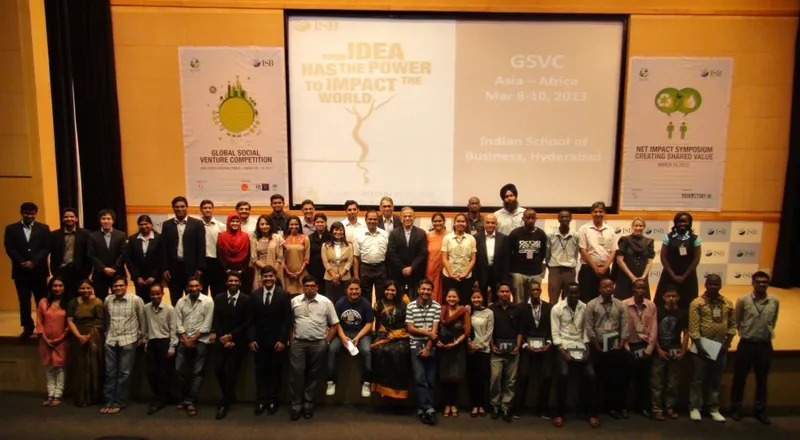Damascus Fortune And Vi-Care To Compete For $25,000 At GSVC Global Finals

Today, at the Indian School of Business (ISB) campus in Hyderabad, the 2013 edition of Global Social Venture Competition (GSVC) Asia-Africa Finals concluded with two social ventures moving on to the global finals at UC Berkeley. For the past three days, social enterprises from four countries across Asia and Africa have gathered at ISB for an intensive weekend of consultation and mentorship from industry leaders in social entrepreneurship.
GSVC was established in 1999 by students at the University of California Berkeley's Haas School of Business in order to foster and promote the emerging social enterprise community around the world. Each year, the competition awards $50,000 in prizes to promising social ventures, and to date has granted over half a million dollars in prize money to jumpstart new generations of social entrepreneurs.
Yesterday afternoon, after a day and a half of mentorship, the student entrepreneurs behind the 18 nascent social enterprises pitched their revised business plans to a panel of investors and social entrepreneurs. The ventures were then shortlisted down to six social ventures, which pitched earlier this morning in the final round. Shortlisted ventures included Akshay Urja, Damascus Fortune, Utopia, Amrit Tulya, Kisan First, and Vi-Care (see below for details).
After a second round of pitches this morning, the judges selected two ventures to move on to the Global Finals later this year at UC Berkeley. The two winners of the Asia-Africa Finals were: Damascus Fortune, represented by Vivek Nair and Venkateswara Rao, which has developed ground-breaking technology to convert carbon dioxide emissions into carbon nanotubes, carbon fibres, and carbon nanotubes; and Vi-Care, represented by Abishek Khanolkar and Karthik Shandilya, a venture that has developed a ground-breaking mobile-based diagnostic tool to detect pneumonia in infants.
Damascus Fortune and Vi-Care will join the winners of the other regional competitions on April 12th, 2013 at the Haas School of Business, UC Berkeley, to compete for up to $25,000 to take their social ventures to the next level.
Note: YourStory.in was the media partner for GSVC Asia-Africa.
Complete list of the 18 social ventures selected for GSVC Asia-Africa 2013:
Akshay Urja from Great Lakes Institute of Management: Uses a solar hydrogen hybrid system to provide clean, grid-independent electricity that can power a house 24/7 and fuel that can be used to power cars and gas stoves.
Amrit Tulya from R.A. Poddar Institute of Management, India: Uses renewable solar energy to run a reverse osmosis system of water purification.
Banana from Buddha Institute of Science and Research College, Indi: Reduces Banana Pseudostem Waste with a machine that produces fibre, pulp and sap from the banana pseudostem, helping the environment and expanding employment to rural communities.
Banana Beauty from University of Dhaka, Bangladesh: Improves the living standards of tribes in Bangladesh by employing them to produce high quality and low cost yarn processed from the banana stem.
Breson from Wellingkar Institute of Management, India: Designs and manufactures customized small wind turbines and pumps with the potential of powering a 15 story building for 12 hours per day.
Damascus Fortune from IIT-BHU, India: Has developed ground-breaking technology to convert CO2 emissions into carbon nanotubes, carbon fibres, and carbon nanotubes - materials that can be used for manufacturing planes, trains and automobiles - while simultaneously reducing greenhouse gas emissions.
DriveLease from Narsee Monjee Institute of Management Studies (NMIMS), India: Partners with existing driving schools to train aspiring youth to become well-trained professional drivers in order to reduce the amount of accident-related deaths in India.
EcoResin from Massachusetts Institute of Technology, based in Bangladesh: A triple bottom line company that produces high grade post-consumer resin (PCR) out of recycled plastic to introduce a new, "green plastic" to Bangladesh.
Jan Ni Jal Dhara from Tata Institute of Social Science, India: Hopes to provide solar powered manual irrigation systems to promote proper utilization and revitalization of small surface water irrigation resources such as tanks, ponds, check dams and wells.
Kisan First from Kellogg School of Management (alum), India: Empowering farmers by establishing processing units for their crops, allowing them greater ownership over the value chain, and enabling them to turn greater profits on their crops.
Noble Snails from University of Nigeria, Nsukka, Nigeria: Addresses the issues of unemployment and malnutrition in Nigeria by farming snails as a rich source of protein and distributing them to the meat to markets throughout the country.
SIFI from Indian School of Business (ISB), India: Serves as a matchmaker between enterprising individuals who want to create a positive social impact and the social-impact activities of credible organizations.
Utopia from Symbiosis Centre for Information Technology, India: Has developed rickshaws capable of being operated by physically differently-abled individuals, as well as a water purification system that works using the energy generated by operating the rickshaw.
Vi-Care from IIT-Madras, India: Offers a ground-breaking diagnostic tool to detect pneumonia in infants using a mobile phone.
Your Legal Consult from ISB, India: Uses a web based platform to expand the knowledge and awareness the Legal Rights of a user, who would typically go uninformed due to the high cost of attaining legal services.
Summer A.B.E School from MPUC, Kenya: Working to expand secondary education to Mombasa County by establishing schools aimed at enrolling students over 18 years old, offering quality secondary education, motivation, and mentorship using a non-formal and time-flexible education structure.
GoRecycler from Strathmore University, Kenya: Uses a mobile and web based platform to engage and unite various segments of the waste sector into a holistic and transparent process of supply chain integration.
Cheru Tours from Strathmore University, Kenya: Serving tourists with a desire to simultaneously experience the beauty of Kenya and to help serve those in need by connecting them with initiatives to help underprivileged children.







